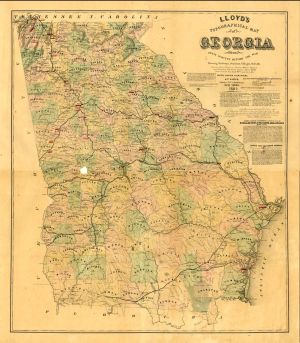 Today the Central Baptist Association of Georgia (Southern Baptist) meets at the First Baptist Church of Christ in Macon. The church is pastored by Ebenezer W. Warren, who preached a fiery pro-slavery sermon on the eve of the war and remains an ardent advocate of African slavery. Warren also holds the position of Chairman of the Central Baptist Missions Committee.
Today the Central Baptist Association of Georgia (Southern Baptist) meets at the First Baptist Church of Christ in Macon. The church is pastored by Ebenezer W. Warren, who preached a fiery pro-slavery sermon on the eve of the war and remains an ardent advocate of African slavery. Warren also holds the position of Chairman of the Central Baptist Missions Committee.
The war looms over associational proceedings. An hour is set aside to pray for the Confederacy, and the report on missions is infused with concern for army missionaries:
The demoralizing tendencies of war, both in the army and at home, are subjects of the most anxious solicitude to every truly pious heart. An army of citizens who have been accustomed from early childhood to the pious influences of the Sabbath and the sanctuary, bereft for months and years of these means of moral improvement, cannot be expected to advance in virtue and in the development of christian feelings and principles, but the facts have proved a fearful retrogression. There have been, however, for the past few months, many gracious tokens of the Divine favor, in the conversion of thousands in our armies; and the desire which our army every where manifests for religious improvement instructs us that the field is white to the harvest, and bids us enter and gather its sheaves.
At home our hearts and churches bear sad testimony to the moral revulsion. Spirituality has sadly waned; prayer, we fear, has been restrained, and “the love of money, which is the root of all evil,” has increased with fearful and threatening rapidity.
What must be done to stay this tide of spiritual desolation, is a question of most solemn import. It demands the prayerful consideration of every lover of Jesus.
The gospel is the only remedy for all moral evils; it is the only star of hope that now appears to guide us on safely amid the threatening aspects which surround our beloved Zion. Our souls demand a closer walk with God, a heavenly frame of mind, a likeness to our Saviour, the idols torn from our hearts that we may give them all to God.
Then, as to the home field, your committee would recommend, that this association raise a sufficient amount of money to keep one missionary constantly in the army, and supply him with religious reading for his mission; that every pastor, at his earliest convenience, lay this matter before his churches, and obtain their pledges for what ever amount they may be willing to pay.
We also recommend enlarged contributions to our Colporteur Society, which is doing a very good work, and only needs more funds to enlarge its operations. The popularity of the Christian Index, and its usefulness in the army, call for the distribution of thousands of copies weekly for our soldiers….
In conclusion, your committee would suggest,
1st, That it is doubtful whether we have ever fully grasped the idea, that under God we are to save the world and our country….
The association, however, unlike many Southern Baptist associations meeting this summer and fall, declines to pass a resolution of support for the Confederacy. Perhaps the reason for such non-action on this matter is the fact that many of the association’s churches have never gone on record in support of the Confederacy. While larger congregations tend to count prominent slaveholders — and many slaves — as members, others congregations are heavily comprised of common white folk who do not own slaves.
In the larger perspective, the Southern Baptist churches of middle Georgia during the war are clearly divided regarding the war: one-third evidence pro-Confederacy views during the war; one-third reference the war in the abstract only; and one-third never mention the war in their church records.
Sources: Minutes of the Central Baptist Association, Held With the Macon Church, Bibb County, GA., August 22nd and 24th, 1863; see Bruce T. Gourley, Diverging Loyalties: Baptists in Middle Georgia During the Civil War, Macon, Ga.: Mercer University Press, 2011 (link)


